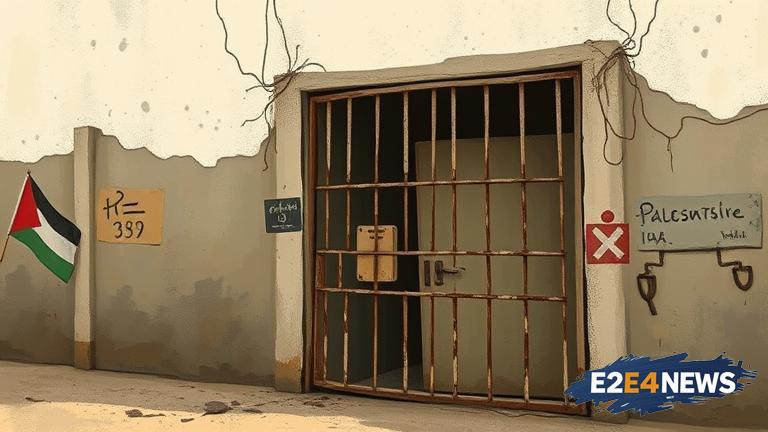The plight of Palestinian prisoners in Israeli jails has been a longstanding issue, with many facing harsh conditions, including medical neglect, solitary confinement, and limited access to basic necessities. Despite international condemnation, the Israeli authorities continue to detain Palestinians, often without charge or trial, under the guise of security concerns. The conditions in these prisons are dire, with prisoners often subjected to overcrowding, poor sanitation, and inadequate healthcare. Many prisoners have reported being denied medical treatment, leading to severe health complications and even death. The use of solitary confinement is also widespread, with prisoners often being held in isolation for extended periods, leading to psychological trauma and mental health issues. The Israeli authorities have been accused of using these tactics as a means of breaking the spirits of Palestinian prisoners and suppressing their resistance to the occupation. The situation is further complicated by the fact that many Palestinian prisoners are being held in prisons located inside Israel, making it difficult for their families to visit them. The Israeli authorities have also been accused of restricting the movement of prisoners, making it difficult for them to access basic necessities such as food, water, and clothing. The international community has been criticized for its failure to intervene in the situation, with many calling for greater pressure to be put on the Israeli authorities to improve the conditions in their prisons. The Palestinian Authority has also been accused of not doing enough to support the prisoners, with many calling for greater action to be taken to secure their release. The issue of Palestinian prisoners is a highly emotive one, with many Palestinians seeing them as heroes and martyrs in the struggle against the occupation. The Israeli authorities, on the other hand, view them as security threats and terrorists. The situation is further complicated by the fact that many Palestinian prisoners are being held under administrative detention, a system that allows for detention without charge or trial. This system has been widely criticized as a means of circumventing the rule of law and denying prisoners their basic rights. The use of administrative detention has been particularly widespread in recent years, with many prisoners being held for extended periods without being charged or tried. The Israeli authorities have also been accused of using the system as a means of punishing prisoners for their political activities, rather than for any actual security threat they may pose. Despite the challenges they face, many Palestinian prisoners continue to resist their detention, with some going on hunger strike to protest their conditions. The hunger strikes have been met with widespread support from Palestinians and international activists, who see them as a powerful symbol of resistance against the occupation. The issue of Palestinian prisoners is a complex and deeply emotive one, with many different perspectives and opinions on the matter. However, one thing is clear: the conditions in Israeli prisons are unacceptable and must be improved. The international community has a responsibility to act to ensure that the basic rights of Palestinian prisoners are respected and that they are treated with dignity and respect. This includes calling for an end to the use of administrative detention, improving the conditions in prisons, and ensuring that prisoners have access to basic necessities such as food, water, and medical care. Ultimately, the issue of Palestinian prisoners is a symptom of a larger problem: the occupation itself. Until the occupation is brought to an end, the situation of Palestinian prisoners will continue to be a major concern. The international community must take action to support the Palestinian people in their struggle for freedom and self-determination, and to hold the Israeli authorities accountable for their actions.
